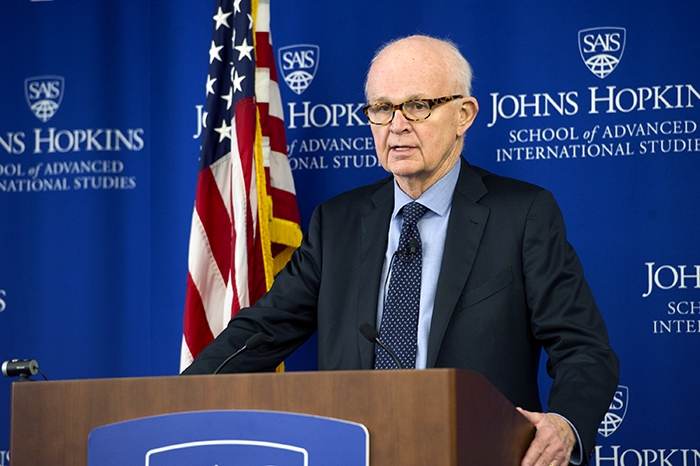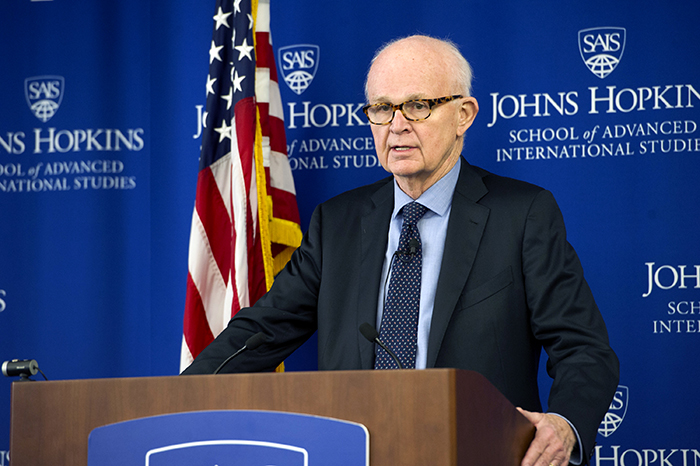Stephen Bosworth, 1939-2016

Ambassador Stephen Warren Bosworth died of pancreatic cancer in his home in Boston on Monday, January 4, 2016.
Stephen Bosworth was a career American diplomat and was chairman of the U.S.-Korea Institute at Johns Hopkins School of Advanced International Studies (SAIS) and held an appointment as a senior fellow at the Belfer Center for Science and International Affairs at the Harvard Kennedy School of Government. He was also served as the Payne Lecturer at the Freeman Spogli Institute at Stanford University in 2014.
Ambassador Bosworth served as dean of The Fletcher School of Law and Diplomacy at Tufts University from 2001-2013. His administration at Fletcher is credited with increasing the size of the Fletcher faculty and student body while securing the financial soundness of the school during a period of economic uncertainty. He oversaw the creation of new degree programs that have significantly expanded the scope of The Fletcher School's teaching, research, and global outreach. During his tenure as Dean at the Fletcher School, Ambassador Bosworth also served President Obama and Secretary of State Hillary Clinton as United States Special Representative for North Korea Policy from 2009 to 2011.
"Stephen Bosworth was among the best diplomats of his generation. A consummate professional and a student of history, he managed American foreign policy skillfully at critical junctures and left an indelible imprint on America's policy toward Asia,” said Vali Nasr, dean of Johns Hopkins SAIS, “He was a transformational dean at the Fletcher School at Tufts University where he oversaw development of new programs. Insightful, kind and considerate, he was a great influence on friends and colleagues and generations of students who studied international affairs."
Throughout his diplomatic career, he served three presidents as U.S. Ambassador: to Tunisia from 1979 to 1981 under President Carter; to the Philippines from 1984 to 1987 under President Reagan; and to South Korea from 1997 to 2001 under President Clinton.
Before his appointment as Ambassador to South Korea, Stephen Bosworth was the Executive Director of the Korean Peninsula Energy Development Organization, (KEDO) a multilateral organization created to implement an agreement with North Korea to dismantle their nuclear program in exchange for light water reactors. Before coming to KEDO, he was president of the United States Japan Foundation, a private American grant-making institution with extensive programs in education, leadership exchange, and policy studies. Throughout his deep and extensive involvement with the Koreas and East Asia, he was a consistent advocate of engagement and dialogue.
Jae H. Ku, director of U.S.-Korea Institute, said that Bosworth “represented everything that was great about U.S.-Korea relations. He was a formidable but also a caring public servant who threw himself into peacemaking; he applied his diplomatic tools with knowledge of Korea that only a scholar could possess. We will sorely miss his leadership as our chairman.”
While in the Philippines, Ambassador Bosworth played a central role in helping to assure a peaceful transition of presidential leadership from the regime of long-time dictator Ferdinand Marcos to the democratically elected administration of Corazon Aquino. Prior to 1984, his Foreign Service assignments included Panama, Madrid, Paris, and Washington, DC, where, among other positions, he was the State Department’s Director of Policy Planning, Principal Deputy Assistant Secretary for Inter-American affairs, and Deputy Assistant Secretary for Economic Affairs. In 1987, he received the American Academy of Diplomacy's Diplomat of the Year Award.
Raised on a small farm in Western Michigan where he spent his early school years in a one-room schoolhouse, Ambassador Bosworth received an AB from Dartmouth College in 1961 and an honorary doctorate from Dartmouth in 1986. He was a member of the Board of Trustees of Dartmouth College from 1992 to 2002 and served as chairman from 1996–1999.
Ambassador Bosworth was deeply committed to political reform and constructive civic dialogue in the United States. He served on the Executive Committee of Americans Elect, a political party seeking to gain ballot access in every state in 2012.
He is survived by his wife Christine, his four children Allison and Andrew Bosworth and William and Stacey Rutledge, their spouses, ten grandchildren, and his brothers Barry and Brian Bosworth.
The family of Stephen Bosworth expresses deep appreciation for the condolences and remembrances from friends and colleagues around the world. The family is planning a public memorial in February or March at a date and location in the Boston area to be announced soon. The family encourages donations in lieu of flowers to the Bosworth Scholars program at The Fletcher School. Please visit the U.S.-Korea Institute website for updated details.